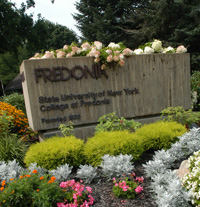 There was no summer vacation in the drive for greater sustainability across the SUNY Fredonia campus.
There was no summer vacation in the drive for greater sustainability across the SUNY Fredonia campus.
While many students were away from residence halls and classrooms, the university implemented a wide range of recycling, landscaping and energy-use initiatives during June, July and August.
Perhaps the most impressive recycling achievement was the collection of 8,500 pounds of clothing, 800 pounds of food, 300 pounds of personal care items, and assorted electronic, household and sporting goods from students as they left campus at the end of the school year. The items were donated to Chautauqua County Rural Ministries, located in downtown Dunkirk, where they will be re-used — or in some cases, used for the first time — by underprivileged families throughout the region.
In addition, many older pieces of furniture used within the residence halls were sold during the annual Village-wide yard sale in June, thereby sharply curtailing the amount taken to the county landfill. All of the mattresses from residence halls which had reached the end of their useful lives were also recycled.
Another three tons of recyclable materials was also collected during “Move-In” weekend alone, as students came back into the residence halls in August. Bags, boxes and other packing materials were among the most prominent materials recovered.
“When students are moving in or out, it’s a fairly hectic, tiring and often emotional day for them and their families,” said Kevin Cloos, director of Facilities Services and a member of the campus’ Sustainability Committee. “Issues like recycling or reusing items are usually — and understandably — far from their minds. So we’ve taken the responsibilities on ourselves, and we’ve made quite a positive impact by doing so.”
Other new initiatives include the recycling of unsoiled paper towels in the Williams Center, Houghton, Jewett and Fenton Halls, and the Administrative Services Complex with the installation of new recycling containers placed right under or adjacent to the paper towel dispensers.
As part of a major renovation project in Alumni Hall, all of its interior doors were recycled, with most being given to the local chapter of Habitat for Humanity, a not-for-profit organization which helps build residences for low-income families. SUNY Fredonia also recycled over 50,000 pounds of scrap metal salvaged during its various construction projects this summer, in addition to various construction and demolition debris generated.
Under the energy consumption category, the campus purchased a new Park and Ride bus that runs on bio-diesel fuel, as well as two new electric GEM cars (Global Electric Motorcars), increasing the campus’ electric-vehicle fleet to nine.
And those blue lights on all 20 emergency phones located throughout the campus? Each was replaced with LED energy efficient bulbs — which collectively use less energy than just one of the older bulbs.
Below-the-surface, progress continued on the completion of the $22 million campus-wide satellite heating and cooling system, set to be completed in occurs in November.
“President Hefner has joked that he’s never spent $20 million on a project that no one can see before,” said Mike Barone, director of Public Relations and a fellow Sustainability Committee member with Cloos. “But this new system will allow the campus to conserve a lot of energy that previously had been lost due to waste and inefficiencies of the former system, not to mention the reduction of wasted energy into the atmosphere. This summer alone we estimate that Fredonia spent close to 75% less on natural gas.”
Other infrastructure efforts included installing energy management controls to the Fenton Hall general exhaust fan, connecting Maytum Hall’s hot water system to the energy management system, and cleaning the ventilation coils to improve air flow and efficiency.
Boxes utilized during the Maytum Hall relocation were reused by the occupants during each of the staggered phases of the move, thereby lowering moving costs and the impact that it had on the environment.
The campus also continued to reuse materials, such as concrete block and doors for new projects, at other locations. Purchases and installation of furniture and construction materials were made from a sustainability vendor.
The grounds and landscaping crews did their part as well, adding new perennial planting beds at Gregory Hall, University Stadium, the outdoor quad amphitheater, Dods Hall and Mason Hall to reduce labor costs and the cost of annually purchasing new plants. Natural wood chips were also spread on several planting beds. A campus-wide tree inventory and assessment was also initiated.
“Despite all of these great accomplishments, we know this isn’t the kind of thing that has a finish line,” Cloos assured. “There are always opportunities to reevaluate the way we all live our day-to-day lives here on campus, and how that impacts the region and the world. And that means, there’s always a chance we can do something even better. As far as I’m concerned, that just keeps life exciting for us all.”



